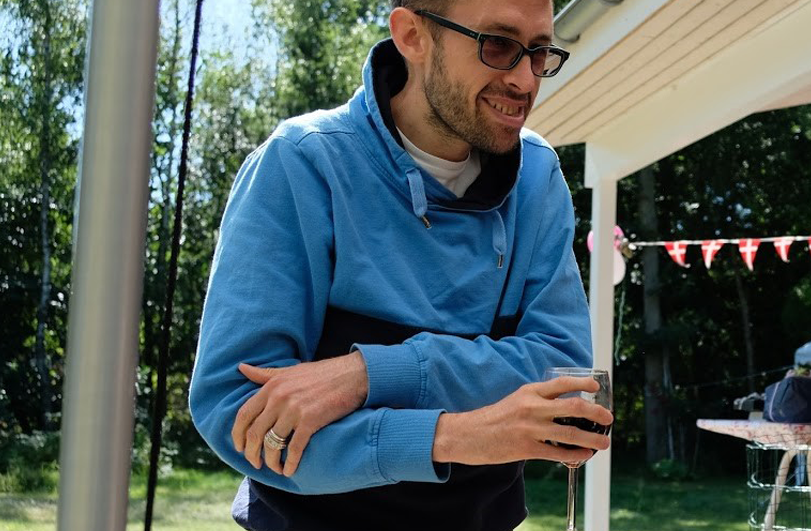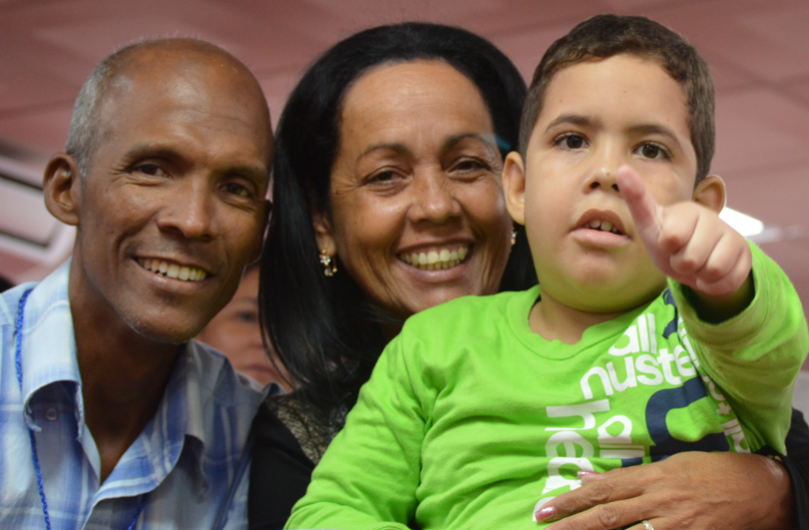Personal Care for People with PWS
Personal care is an important part of everybody’s daily routine. However some people with Prader-Willi syndrome (PWS) have a reluctance, or a reduced ability to complete personal care routines properly.
Factors such as obesity or lack of coordination can make it difficult for a person with PWS to reach all areas of their own body, and a lack of motivation or time can impact the care and thoroughness of cleaning routines. Poor sequential processing or difficulty in completing multi-stepped tasks, often inhibits the thoroughness of washing. For example: the person with PWS may just stand under a shower rather than wash themselves. Many have very poor body image. While some people with PWS take a lot of pride in their appearance, others are not as concerned about their appearance and are insensitive to social hygiene expectations or are unable to manage daily personal hygiene routines, without assistance. Lack of routine personal care can lead to health issues such as tooth decay and skin infections. Poor hygiene can also impact negatively on socialisation and create a barrier to forming friendships. It can also trigger conflict with parents, siblings, fellow house residents and co-workers. Some people with PWS are not aware of this issue and may need you to explain it to them and remind them of the importance of routine personal care. Using visual cues or pictures of processes is a great help!
People with PWS are often prone to infections due to skin picking, poor blood circulation, poor hygiene, dry skin and diabetes. Their feet can need extra care such as orthotics and regular moisturising, and even the correct positioning of socks and shoes to prevent blisters.
People with PWS can have dental problems due to teeth grinding, the heavy consumption of acidic or sugary food and drinks or the acid that occurs from oesophageal reflux or the regurgitation of food. A strict routine for effective cleaning teeth is vital to help prevent tooth and gum deterioration. Good personal care usually requires the help of family or carers.
Managing the Necessary Routine of Personal Care
The person with PWS needs to routinely wash hands with soap and dry them well, after each visit to the bathroom. Handwashing should be routine before meals and after any activity that involves soiling of hands, for example, gardening. Learning by seeing others doing the same, pictures of the process and a standard routine are most effective strategies!
Daily Personal Care Routine
A daily personal care routine as suggested below, can often be maintained with reminders, once it has been established. Despite some people with PWS becoming fixated with such a routine, the positive outcomes from making personal care a normal daily activity are beneficial for all concerned. If done properly, care routines can also provide a good opportunity to check for sores and infections that have resulted from skin picking, without confrontation. People with PWS often try to hide their skin picking to void blame, so it is better not to overact or become upset if you do notice a sore or infection. Try to deal with it without showing any emotion. This way you may be able to discourage them from hiding these sores in the future. Early treatment with a band aid and antiseptic can reduce the likelihood of infection, but once an infection is suspected, medial assessment and possible treatment with antibiotics is required.
To establish a daily personal care routine, set a time that suits the person with PWS and the household within which the person lives. Allow adequate time for the person with PWS to complete their care routine properly and be available to assist or prompt if needed. This time should reduce once the routine is established, but may be lengthy at the start.
Be mindful of the requirements of others in the house when setting the personal care time!
Keeping Your Body Clean – to discuss with your person with PWS
- Shower or wash daily: avoid baths, if possible, as sitting in hot water, especially when overweight can cause dilatation of blood vessels and lead to a drop in blood pressure. Falling asleep in a bath is a high risk for someone with PWS, especially if they have sleep apnoea.
- Make sure that all areas are properly cleaned including; face; ears; neck; underarms; chest; back; bottom; legs; arms; between the buttocks; feet; between the toes and don’t let them miss any of those hard to reach places. (A body chart on the wall is helpful!) Use a liquid bath soap, soap and sponge or washcloth. The person with PWS may require help or prompting to wash themselves properly. A timer or timed music is handy to prevent prolonged washing, once the routine is established.
- Remember to always check the temperature of the water they are using. People with PWS can make it too hot or too cold!
- Deodorant: apply underarm deodorant daily after washing, once the skin is properly dried.
- Wash hair at least 2-3 times each week: measure out shampoo and conditioner to avoid over use.
- Brush hair daily and keep it tidy. “Remember to brush hair in the front, back, top and both sides of the head”.
- Clean teeth 2-3 times a day: Show how to “floss” as well and brush all teeth properly. One strategy is to encourage the person with PWS to pick a song that lasts a few minutes and keep brushing for as long as the song lasts. Electric toothbrushes are excellent and provide sensory stimulation!
- Moisturise Daily: People with PWS often benefit from moisturising once or twice a day. Particularly the face, arms, feet, legs and any patches of dry skin. Tip: moisturise with a cream that includes sunblock, especially in countries with high UV levels!
- Skin-Check Daily: Check all areas of their body for sores from skin picking. Use antiseptic and cover them up. Offer praise when there are no new sores but don’t get upset if there are sores.
- Clean Fingernails and Toenails Daily: Keep them short and clean to avoid infections from scratching or skin picking. Trim fingernails weekly.
- Clothes: Make sure that clothes are changed daily. Some people with PWS like to reuse yesterday’s clothes. Make sure a routine is in place to put all clothes in a clothes bin. Establish a routine for washing clothes regularly. Alert to wearing clean underwear and socks each day.
- Wash Hands: After going to the toilet, before eating and throughout the day, as needed. Use pictures of the process!
Strategies That Help
- Routines that are practiced daily, at set times. Never let personal care be missed even for a day. People with PWS will generally follow a set routine but may easily slip out of personal care routine.
- Plenty of praise and positive feedback. Encourage taking pride in being clean and smelling fresh.
- Portion control liquid soaps, body/hand lotions, hair products, toothpaste, mouthwash, laundry soap to prevent excessive use and waste.
- A picture chart or white board can be placed on the wall, showing the process of the task, for example, getting dressed. Having a routine with each step that needs to be completed to be ready on time, with a timeframe can be useful. Display charts in task specific rooms, for example “washing hands”- in the bathroom. Music is a fun way to encourage pacing of the activity as well as timing it!
- Having supper or breakfast only after the personal care routine completed is a good way to make sure it is completed, especially if a person is refusing to wash or spends too long doing so. An alarmed timer can also be used to indicate “breakfast is ready!”
- Set regular days for washing clothes. Count the number of items there are to be washed e.g. if you wash once a week there should be 7 pairs of socks to hang out on the line.
- In hot weather allow the feet to breath to reduce the chance of developing fungal infections. Encourage the wearing of open shoes or sandals, especially around the house. Velcro fastened sandals are highly recommended, if the person has no feet problems. Specially fitted shoes may be needed by some people.
- Remind the person with PWS to dress similarly to you, according to the weather! Less clothes when it is warm and more clothes when it is cold. Heavy clothes in hot weather impact on good hygiene!
- Instead of saying you are applying moisturising say you are giving them a massage. This can also improve circulation in the feet, especially for diabetics.
- Encourage and praise good manners. Make sure that you apply personal care rules to everyone that lives in your house. That way it is not just targeted at the person with PWS.
- Set a good example and let the person with PWS know that you are washing your hands before meals and that you brush your teeth at least twice every day be hygienic.
- Encouraging the use of fresh smelling body washes or body lotions to use after showering so washing can be a positive incentive to achieve good hygiene.
Positive personal care not only improves a person’s presentation, but also helps to boost their self-esteem and ongoing sense of responsibility and achievement. People with PWS can be just as proud of how they look as much as anyone else. Compliments are always appreciated and encourage more positive behaviour.
This article was written by IPWSO’s Famcare Board.


International Community
IPWSO was established so that PWS associations, families, clinicians and caregivers around the world could exchange information and support and have a united global voice under one umbrella.
Information for Medical Professionals
The latest medical and scientific research and information, plus guides into common medical issues affecting people with PWS.



